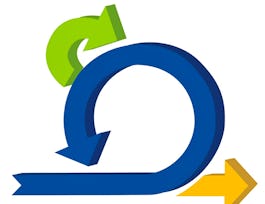Dive into the comprehensive PMP Certification Exam Preparation course, designed to ensure success on your first attempt at the Project Management Professional (PMP) exam. Aligning with the latest PMP Exam content, it blends PMBOK 6th and 7th editions with the Agile Practice Guide, covering Project Integration, Scope, Time, Cost, and Quality.



Guide™ to Project Management and PMI-PMP Certification Exam

Instructor: Packt - Course Instructors
Sponsored by EdgePoint Software
Recommended experience
What you'll learn
Define the expectations of key stakeholders in the project to align project goals and objectives.
Analyze and manage the scope of the project to ensure project deliverables meet expectations.
Apply WBS to determine the project scope and establish a scope baseline to manage changes effectively.
Explain the 12 principles of project management.
Details to know

Add to your LinkedIn profile
7 assignments
September 2024
See how employees at top companies are mastering in-demand skills


Earn a career certificate
Add this credential to your LinkedIn profile, resume, or CV
Share it on social media and in your performance review

There are 17 modules in this course
In this module, we will provide a comprehensive overview of the PMP certification exam. You'll learn about the exam's purpose, the journey you'll undertake, and the qualifying criteria. Additionally, we'll delve into the application process, maintaining your credentials, the content covered in the exam, question types, and tips for success.
What's included
9 videos1 reading
In this module, we will explore the comprehensive landscape of project management. You'll gain insights into the six W's of project management and examine illustrative examples like the Pyramid Project using the Waterfall approach, and Project Mortar and Pestle with Agile methodologies. Additionally, we'll discuss innovative approaches like Project Mortar and Pestle by Drones, highlighting adaptive techniques.
What's included
7 videos
In this module, we will delve into the essential elements of the project management framework. You'll learn what constitutes a project and the principles of project management. We'll cover the system of value delivery, systems thinking, and the matrix environment. This section also explores enterprise environment factors, project constraints, and the various process groups. We'll further examine key knowledge areas including integration, stakeholder, scope, schedule, cost, HR, quality, risk, communication, and procurement management.
What's included
17 videos1 assignment
In this module, we will focus on the importance of integration management and the development of a project charter. You'll learn how to create a project charter that provides a clear vision and objectives for the project. We'll introduce a template to facilitate this process and explore digital content artifacts that help document and communicate the project charter effectively.
What's included
3 videos
In this module, we will explore the fundamentals of stakeholder management. You'll learn how to identify key stakeholders and understand their roles and interests. We will provide a stakeholder register template to help you systematically document stakeholder information. Additionally, we will discuss the creation of digital content artifacts that ensure efficient communication and management of stakeholder details.
What's included
3 videos
In this module, we will cover the critical aspects of scope management. You'll learn what project scope entails and how to collect and document requirements effectively. We'll delve into defining the project scope and creating a Work Breakdown Structure (WBS) to break down project deliverables. Additionally, we'll explore the project scope baseline and the use of Microsoft Project as a tool for managing scope, including an explanation of the user interface and entering scope items.
What's included
9 videos1 assignment
In this module, we will focus on the essential elements of schedule management. You'll learn how to define and sequence activities and estimate their durations. We will cover techniques such as the Critical Path Method and schedule compression methods like crashing and fast-tracking. Additionally, we'll provide digital content artifacts including milestones, network diagrams, duration estimates, and project schedules. Finally, you'll gain hands-on experience with Microsoft Project by entering activities, sequencing them, creating Gantt charts, and developing the project schedule.
What's included
10 videos
In this module, we will delve into cost, human resources, quality, and risk management. You'll learn to estimate costs and determine the project budget, supported by digital content artifacts like the project budget document. We'll cover estimating activity resources and planning quality, with corresponding artifacts such as project resources and quality metrics. You'll be introduced to risk management, identifying risks, and performing both qualitative and quantitative risk analyses. Finally, you'll learn to plan risk responses, utilizing a risk register to document and manage potential project risks.
What's included
13 videos
In this module, we will focus on communication and procurement management. You'll learn to develop a communication plan that ensures clear and effective information dissemination throughout the project. We'll also cover planning procurement activities, including making decisions on whether to make or buy necessary resources. Additionally, we'll provide digital content artifacts like the communications plan, make/buy decisions documentation, and statements of work (SOW) to support these processes.
What's included
4 videos1 assignment
In this module, we will explore the integral aspects of integration management, focusing on how to execute and manage project work effectively. You'll learn to develop an overarching project management plan, including individual management plans, with corresponding digital content artifacts. We will cover directing and managing project work, managing project knowledge, and monitoring and controlling project activities. This includes change control processes and cost control methods such as Budget at Completion (BAC), Planned Value (PV), Earned Value (EV), Schedule Variance (SV), and Actual Cost (AC). Finally, we'll guide you through closing a project or phase, ensuring all objectives are met and lessons learned are documented.
What's included
22 videos
In this module, we will introduce you to the key principles of project management as outlined in the PMBOK 7 Guide. You'll learn about being a diligent steward, creating a collaborative project team environment, and effectively engaging with stakeholders. We will discuss focusing on value, recognizing and responding to system interactions, and demonstrating leadership behaviors. Additionally, we will cover the importance of tailoring processes based on context, building quality into processes, navigating complexity, optimizing risk responses, and embracing adaptability and resiliency. Lastly, we will explore enabling change to achieve the envisioned future state.
What's included
13 videos
In this module, we will explore Lean principles and practices within project management. You'll learn to distinguish between definable work and high-uncertainty work, and gain insights into the Mortar and Pestle Chocolate Factory as a case study for Lean production operations. We'll discuss key concepts like value stream, lead time, cycle time, and technology value stream. Additionally, you'll learn about throughput, requirements, and the application of Kanban, including setting up a Kanban board, managing batch sizes, and establishing WIP limits to enhance project efficiency and productivity.
What's included
12 videos1 assignment
In this module, we will introduce you to Agile project management. You'll learn about the Agile Manifesto and its guiding principles. We will cover the creation and management of user stories and how they populate the product backlog. We'll explore various project lifecycles, including predictive, iterative, incremental, and Agile lifecycles, along with the lifecycle continuum and hybrid lifecycles. Additionally, you'll gain insights into the role of the Product Owner and their responsibilities in an Agile environment.
What's included
12 videos
In this module, we will focus on creating and nurturing an Agile environment. You'll learn about the importance of adopting an Agile mindset and how it influences project management practices. We will discuss the concept of servant leadership and its impact on team dynamics. You'll explore the characteristics of effective Agile teams and the collaborative processes they follow. Additionally, we'll clarify the evolving role of the project manager in an Agile setting, highlighting the shift from traditional project management to Agile methodologies.
What's included
4 videos
In this module, we will cover key practices for delivering projects in an Agile environment. You'll learn how to plan iterations by refining the backlog, and how to conduct demonstration/reviews and retrospectives to assess progress and identify improvements. We'll discuss the importance of daily stand-ups for maintaining team alignment and addressing issues. You will explore concepts like Minimum Viable Product (MVP) and Minimum Marketable Product (MMP), with an example from the Mortar and Pestle app. Additionally, we'll delve into Scrum practices, defining the "Definition of Done," using story points for estimating effort and measuring team velocity to track performance and plan future iterations.
What's included
10 videos1 assignment
In this module, we will provide a practical guide to implementing Scrum using a step-by-step approach. You'll learn to apply Scrum to the Mortar and Pestle project, starting with an introduction to the project and the Scrum team. We will cover creating and prioritizing the product backlog, refining and estimating backlog items, and estimating user stories. You will also gain insights into effective sprint planning, making work visible, and conducting daily Scrum meetings. Additionally, we'll discuss how to perform sprint demos/reviews and retrospectives to evaluate progress and improve processes. Finally, we'll wrap up with a comprehensive overview of implementing Scrum.
What's included
12 videos
In this module, we will guide you through the process of creating a compelling PMP exam application. You'll learn how to set up your PMP exam account and correctly enter your educational credentials. We will provide detailed instructions on documenting your work experience to fulfill the PMP certification requirements. Finally, we will conclude the course with a message and instructions on how to obtain your course completion certificate.
What's included
3 videos2 assignments
Instructor

Offered by
Why people choose Coursera for their career




Recommended if you're interested in Business

Politecnico di Milano

Politecnico di Milano

Open new doors with Coursera Plus
Unlimited access to 10,000+ world-class courses, hands-on projects, and job-ready certificate programs - all included in your subscription
Advance your career with an online degree
Earn a degree from world-class universities - 100% online
Join over 3,400 global companies that choose Coursera for Business
Upskill your employees to excel in the digital economy




